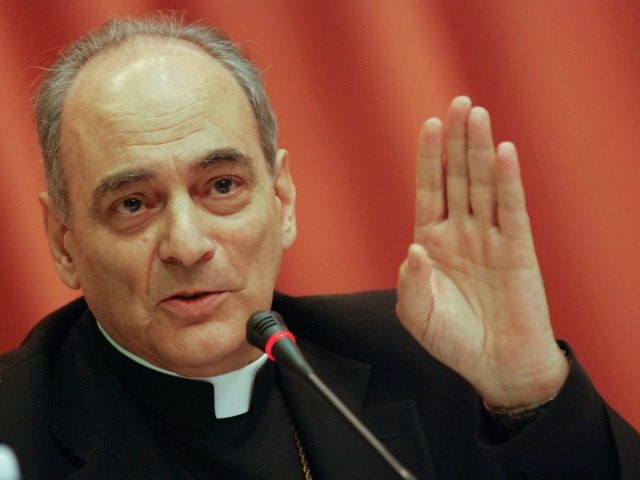The Chancellor of the Pontifical Academy of Sciences has blamed “biological extinction” on global warming, which results from “rich countries’ use of fossil fuels.”
The Chancellor, Argentinian bishop Marcelo Sanchez Sorondo (pictured), told a press conference Thursday that poor countries have been “forced to sell their forests to survive and to use an agriculture that does not employ modern technologies.”
In presenting the conclusions of a Vatican workshop on biological extinction, Bishop Sánchez Sorondo said that solutions to the problem lie in “changing to the use of clean energy, new farming techniques and new urban configurations: small, smart cities.”
“For this to happen, poverty must be eradicated,” he said.”
The Pontifical Academy of Sciences, which boasts of being “multi-racial in composition and non-sectarian in its choice of members” released its conclusions Thursday. The declaration makes the astonishing claim that the “current rate of loss of species is approximately 1,000 times the historical rate,” while also warning that “perhaps a quarter of all species” are presently in danger of extinction and “as many as half of them may be gone by the end of the present century.”
Among its illustrious guests, the Pontifical Academy invited renowned population hoaxer Paul Ehrlich, who gained celebrity status through the publication of his 1968 doomsday bestseller, The Population Bomb.
The book ignited mass hysteria over the future of the world and the earth’s ability to sustain human life. Ehrlich launched a series of frightening predictions that turned out to be spectacularly wrong, creating the myth of unsustainable population growth.
Among his predictions, Ehrlich prophesied that hundreds of millions would starve to death in the 1970s, that already-overpopulated India was doomed, and that odds were fair that “England will not exist in the year 2000.”
To allow women to have as many children as they want, Ehrlich has said, is like letting people “throw as much of their garbage into their neighbor’s backyard as they want.”
In his book, Ehrlich concluded that “sometime in the next 15 years, the end will come,” meaning “an utter breakdown of the capacity of the planet to support humanity.”
While falling into disrepute in serious academia, Ehrlich—who has defended mass sterilization, sex-selective abortion and infanticide—has found a new lease on life thanks to his invitation from the Vatican.
Noting that the world GDP has grown at five times the rate of the global population, the Vatican declaration also alleges that “millions of species” have been threatened with extinction by this “enormous increase in economic activity based on profit and on the use of fossil fuels.”
Such unprecedented economic growth is also “putting huge strains on the earth’s capacity to function sustainably,” the document proposes. “The most obvious associated signs include global climate change and the concomitant damages to the earth’s system that it brings in its wake.”
The declaration does not, of course, prove any causality between human activity and climate variability, but it does take for granted that such causality exists. “Just as human activities are responsible for these negative effects, today we need positive human action for the sustainable development of biodiversity,” the text reads.
Blame for such ecological variability does not fall equally on all of humanity, but predominantly belongs to the wealthy nations.
“The wealthy,” the text states, are “substantially responsible for the increase in global warming and, consequently, the decrease in biodiversity.”
“The poorest people,” the text observes, “do not enjoy the benefits of fossil fuels” and presumably should not be permitted to make us of them, lest they, too, be denounced as enemies of biodiversity.
Not all the news is bad, however.
The declaration states that it would cost only “about $175 billion” to eliminate extreme poverty in the world. One can only assume that the estimated price tag is based on the use of inexpensive fossil fuels in the process rather than wind and solar power.
Ending global poverty would have the added benefit of “protecting our global environment and saving as much biodiversity as possible for the future,” the text reads.
Fortunately for humanity, if the workshop’s predictions are as laughably far off the mark as Paul Ehrlich’s, vast biodiversity may well be with us for the foreseeable future.
Follow Thomas D. Williams on Twitter Follow @tdwilliamsrome

COMMENTS
Please let us know if you're having issues with commenting.